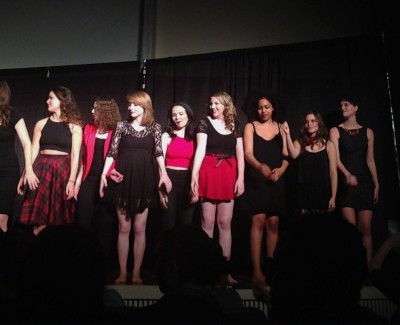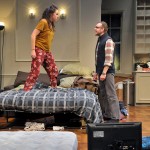
This past weekend, 24 of Boston University’s most courageously unabashed women gathered to talk about one thing: vaginas.
Every year, theatrical groups across the country perform “The Vagina Monologues” as part of V-Day, an activist movement founded by the playwright Eve Ensler in 1998. The movement aims to end violence against women by spreading awareness of this ever-present malady. This year, BU’s own Athena’s Players joined the conversation once again, adding their own voices to the widely produced play.
The play opens with a hilarious and simple introduction by three narrators who, simply put, are “worried about vaginas.” They explain that there is a peculiar silence that surrounds the female body.
In writing the play, Ensler conducted dozens of interviews with women of all ages and backgrounds. “What would your vagina wear?” she asked. “What would it say? What does it remind you of?” These questions certainly broke the silence.
It was found that once women started talking about vaginas, they simply couldn’t stop. Their responses fill a diverse set of monologues that, as the director Daniella Seidl, a junior in the College of Communication, put it, “will make you laugh, cry, scream, squirm, love and laugh some more.” Seidl also wrote her own monologue for this year’s performance, “The Foreign Exchange Student.”
But above all else, the show makes women feel empowered. One of the narrators of the show, Jasmine Elbarbary, a senior in the College of Arts and Sciences, described her experience as one of the most empowering moments of her life.
“Before the show, I never really considered myself a feminist,” she said. “Once I started working on the show, I realized I had been all along.”
“The Vagina Monologues” covers a wide range of topics, all completely necessary for the re-humanization of women, Elbarbary said. In one particularly poignant monologue, a young woman poetically describes her experience as a rape victim of the Bosnia War. During this conflict, it is estimated that over 60,000 women were raped.
“It’s really important to see this show because so many people are uncomfortable talking about these kinds of events,” said Casey Esbin, a student at Rider University who attended the play. “It needs to be brought out in the open.”
A new addition to the show this year discussed another pressing issue at hand: women in short skirts. Mariah Hallacy, a junior in CAS and COM, delivered the monologue “My Short Skirt,” an edgy comeback to constant catcalls. Her character expounds that showing a little more skin is not an invitation, but rather a simple expression of her freedom of choice as a woman, and more importantly, a person.
“It’s an issue that’s really relevant to today, the whole ‘oh, they had it coming’ attitude. Women should be able to wear what they want,” said Siobhan Monaghan, a freshman in the School of Education.
The monologue “They Beat the Girl out of my Boy … or So They Tried” is another addition of this year’s production. The piece incites a Greek chorus to talk about their unifying experience as transgender women.
The topic explored seems to be of great controversy within the present decade. In an interview with Inside Higher Ed, students at Mount Holyoke College revealed their decision to cancel their production of “The Vagina Monologues” this month after proclaiming that it “offers a narrow perspective on what it means to be a women.”
However, at BU, the addition of a monologue provided the opportunity for more women to participate in the “Monologues.” This year’s cast is the largest to date.
“We were up until 3 a.m. deciding whom to call back. We called back 24 girls, and casted every single one of them. We just loved them,” said the show’s producer Stephanie Semet, a senior in COM.
Yet another added feature of this year’s production was a Q&A session. “The show is about social action at its core, so it was amazing to see people’s responses to it,” Semet said.
Both the laughter and the tears that filled the audience during the show were testaments to the show’s success. The cast, the new monologues and the invigorating discussion they roused certainly fulfilled Ensler’s mission to spread awareness and end violence against women.




